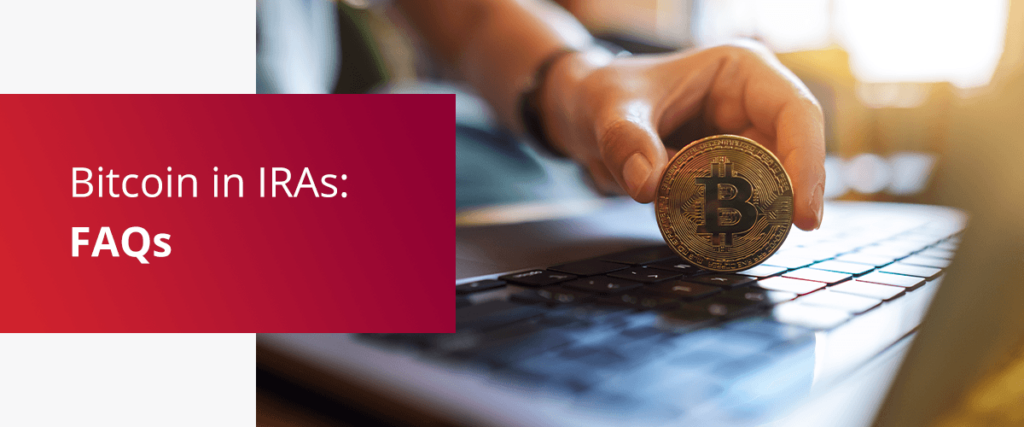
If you’ve considered investing in Bitcoin through your 401(k) or individual retirement account (IRA), this step-by-step guide will help you. We answer some common questions and discuss the benefits, risks and tax implications associated with this process.
Understanding Bitcoin and IRAs
First, let’s look at some basic FAQs on cryptocurrency and IRAs:
1. What Is Bitcoin?
Bitcoin is a form of cryptocurrency that acts as a payment method outside the control of an entity or individual. It eliminates the need for intervention from a third party, such as a bank, to verify transactions. Bitcoin is rewarded to blockchain miners who verify transactions.
The global Bitcoin market is projected to grow at a compound annual growth rate (CAGR) of 26.2% until 2030, primarily due to more efficient, cost-effective payments and secure transactions.
2. What Is a Bitcoin IRA?
As a type of self-directed IRA, a Bitcoin IRA allows you to invest in various cryptocurrencies using retirement savings. A self-directed IRA lets you invest in additional assets — such as cryptocurrency, precious metals and real estate — that are otherwise excluded from conventional IRAs. According to the Retirement Industry Trust Association (RITA), 3%-5% of all IRAs are invested in these alternative assets.
3. Can You Invest in Bitcoin Through Your 401(k) or IRA?
Yes — cryptocurrency is often available through 401(k) plans and IRAs, although access can depend on the specific plan provider.
What Are the Benefits of Holding Bitcoin in an IRA?
Bitcoin IRAs can provide various benefits for investors:
- Potential for high returns and long-term growth: Bitcoin IRAs have the potential for high returns due to cryptocurrency’s volatile nature. Bitcoin’s price has significantly increased over the past few years. Many investors have faith in its future potential if crypto becomes more widely accepted as a means of exchange.
- Diversification for retirement portfolios: Bitcoin can help diversify your retirement portfolio, reduce risk and maximize potential returns. Additionally, Bitcoin can provide a barrier against inflation since the dollar’s value has decreased against other currencies.
- Tax advantages: A Bitcoin IRA can simplify taxes for cryptocurrency investors. Buying and selling assets through an IRA can reduce your capital gains taxes, which we discuss in more detail later.
What Are the Risks and Considerations With Bitcoin IRAs?
While a Bitcoin IRA can increase your investment returns, it can also introduce some risks to your retirement portfolio:
Market Volatility
While any investment involves the risk of financial loss, the price of Bitcoin can be especially unpredictable. For instance, its price reached $65,000 in 2021 and significantly declined to $15,500 a year later. This volatility may put your future at risk if you’re nearing retirement age.
One of the best ways to prepare for market volatility is to stay informed. Join online communities, subscribe to newsletters and read forums to gain insights and monitor the latest market trends.
Security Concerns
Bitcoin is a digital token, meaning hacking and security breaches are possible. That’s why security should be a top priority when selecting a Bitcoin IRA provider. It’s important to do your due diligence and ask these questions when shopping for platforms:
- How long has the platform been around?
- How many — if any — security breaches has it experienced?
- Does it have an insurance policy in place for such incidents?
How Do I Invest in Bitcoin Within an IRA?
In some ways, Bitcoin IRAs work similarly to standard ones, only you purchase cryptocurrency rather than mutual funds. You can choose a traditional or Roth IRA, and you can roll over funds from an existing 401(k) or IRA.
Opening and managing a Bitcoin IRA is easy, though it has a few more steps than a standard IRA. Unlike establishing a conventional IRA and buying and selling your securities in one location, Bitcoin IRAs require three main components:
- Custodians: All self-directed IRAs must have custodians to hold the assets and ensure the account complies with IRS and government regulations. While financial institutions and banks serve as custodians for traditional IRAs, crypto custodians exist specifically for Bitcoin IRAs.
- Cryptocurrency exchanges: These platforms streamline the buying and selling of cryptocurrency from your Bitcoin IRA.
- Secure storage methods: These solutions help safeguard your cryptocurrency from theft. Bitcoin IRA providers typically use proprietary storage systems to protect your crypto after you purchase it.

How to Buy Bitcoin in Your IRA
Here are the basic steps to purchase cryptocurrency within an IRA:
- Select your provider. The first step is choosing a crypto exchange — the platform for buying and selling crypto — to store your assets and adhere to IRS standards.
- Open your account. After choosing a provider, you’ll need to enter personal details like your legal name, bank account information, address and social security number.
- Fund your account. You must fund your Bitcoin IRA before you can purchase Bitcoin. There are two ways to do this — transferring funds from your bank account, or rolling over an existing retirement account.
- Make a purchase. Determine how much you want to invest in Bitcoin, then enter this dollar amount into your chosen investing platform.
- Store your tokens. Finally, you’ll need a secure storage solution to hold your tokens. Your investing platform may recommend a custodian that ensures compliance with IRA rules.
Rolling Over Your Traditional IRA Into a Bitcoin IRA
Once you’ve chosen your Bitcoin IRA provider, you can follow these steps to roll over your IRA to your Bitcoin IRA:
- Contact your IRA plan administrator. If you receive IRA statements, the account statements likely include the administrator’s details. The administrator will gather the necessary paperwork to streamline the rollover process.
- Request a transfer check from your former provider. An IRA provider can give you a transfer check that rolls your funds into a self-directed IRA. You can request this check and inform your old provider about your new IRA.
- Verify funding from your new Bitcoin IRA provider. Confirm the transfer was completed smoothly and your assets went to your intended Bitcoin IRA provider.
Transaction, platform and security fees can vary by provider, and self-directed IRAs require additional documentation and a custodian to handle your holdings. As such, Bitcoin IRAs can be more expensive than traditional and Roth IRAs.
Tax Implications and Withdrawals
Lastly, we’ll answer some FAQs regarding taxes for Bitcoin IRAs:
Do You Pay Taxes on Bitcoin IRAs?
You do pay taxes on IRA funds. However, when you pay taxes depends on the type of IRA you have:
- Traditional IRAs: Traditional Bitcoin IRA contributions are tax-deductible up to a certain limit. You will pay taxes when you withdraw funds at retirement.
- Roth IRAs: Contributions to Roth Bitcoin IRAs aren’t tax-deductible. However, you will not pay taxes when you withdraw funds at retirement.
A Bitcoin IRA can potentially decrease your capital gains tax bill. The IRS considers Bitcoin an investment — therefore, when you sell it, the transaction qualifies for capital gains taxes if the funds aren’t held in an IRA. However, transactions within an IRA are shielded from taxes, meaning you won’t pay taxes on profits from selling crypto in an IRA.
You can obtain a 1099-R form from your custodian to report crypto distributions from your IRA. You may also receive a 1099-B form to show your transactions, along with any gains or losses.
Can You Withdraw Money From a Bitcoin IRA?
You can withdraw funds from a Bitcoin IRA penalty-free after age 59.5, but other requirements vary depending on the IRA type:
- Traditional IRAs: You’ll pay income taxes on withdrawals based on your current income. Because income is generally lower after you retire, the tax rate may also be lower. You must also make required minimum distributions (RMDs) once you reach age 72.
- Roth IRAs: You won’t pay taxes on qualified withdrawals, as you pay taxes on contributions upfront with after-tax income. Roth IRAs have no RMDs.
Additionally, you can use the proceeds from your Bitcoin IRA to purchase other eligible assets — such as precious metals or cash — provided they remain within the IRA.
Invest in Bitcoin With Assistance From Accuplan
Our team at Accuplan can help you embrace the future and harness the power of digital currency. We help clients establish self-directed IRAs, including traditional and Roth, enabling investments in additional assets like Bitcoin. Our simplified process includes the following steps:
- Setting up an account: Completing our application only takes a few minutes.
- Funding your account: Contribute, transfer or rollover funds into your IRA.
- Selling or purchasing crypto: Buy or sell digital currency immediately.
You can purchase cryptocurrency through Accuplan without going to an exchange first. We offer a convenient option for buying, selling and even day trading crypto within your retirement account. Once you open an account, our trading platform makes buying and selling cryptocurrency easier than ever. Contact us today for more information about investing in cryptocurrency with an IRA through Accuplan.

Disclaimer: Our information shouldn’t be relied upon for investment advice but simply for information and educational purposes only. It is not intended to provide, nor should it be relied upon for accounting, legal, tax or investment advice.